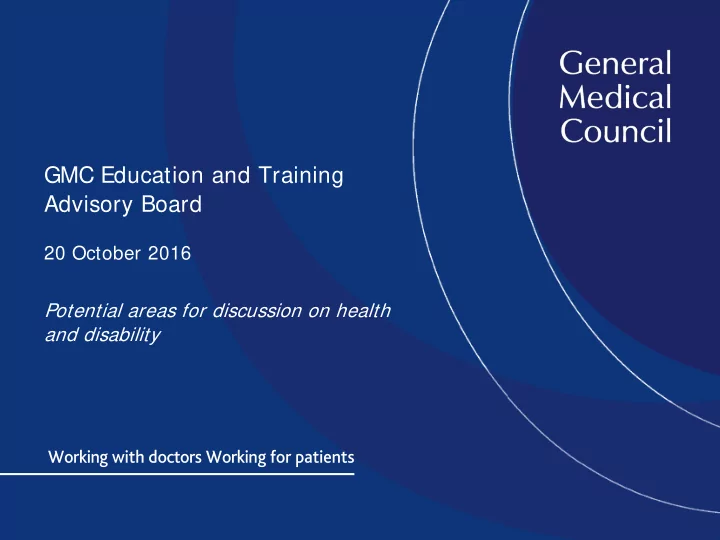

GMC Education and Training Advisory Board 20 October 2016 Potential areas for discussion on health and disability
Entry into undergraduate medical education - perspective What are the challenges for prospective medical students with health and disability issues? What improvements would you like to see in the current processes? What would you prioritise? How can we implement these improvements? What can the GMC do? What can other organisations do? What are the next steps?
Entry into undergraduate medical education Frequently raised issues: University policies do not reflect specific needs of Medical Schools and specific circumstances of applicants to Medicine Adjustments and support that may be available to medical students may differ from those considered reasonable by HEOPS, GMC or potential employers
Entry into undergraduate medical education What are the challenges for prospective medical students with health and disability issues? Already concerned about the selection process, compounded by concern about their health or disability hampering them further No central source of information. Impression of lack of consistency
Entry into undergraduate medical education Lack of consistency because..: HEOPS guidelines not easy to find for potential applicants HEOPS guidelines not written for potential applicants University policies may differ from Medical School policies or from HEOPS guidelines Selectors uncertain about impact of disability on medical school career or subsequent career as a doctor
HEOPS (Higher Education Occupational Physicians) Medical Students – Standards of medical fitness to train First published 21/10/2010 Current version 09/02/2016
Medical Students – Standards of medical fitness to train Standards are defined by GMC & DH HEOPS document provides guidance to those assessing fitness to train and to meet required standards by graduation. Testing for immunity and infection Assessment of functional capacity Health screening questionnaire and the occupational health process
HEOPS (Higher Education Occupational Physicians) General guidance on adjustments for students training in regulated professions First published 15/08/2016 Current version 02/09/2016
General guidance on adjustments for students training in regulated professions Training institutions are obliged to assess all students entering regulated professions for fitness to train at enrolment. This includes fitness to practise in the relevant discipline after graduation. Assessment of fitness to meet competencies is undertaken by assessing function, not by diagnosis.
General guidance on adjustments for students training in regulated professions Application by a regulator of a competence standard to a disabled person is not disability discrimination, providing the competence standard is a proportionate means for achieving a legitimate aim. Example of a competence standard: Literacy and numeracy
“..obtaining, recording and interpreting a comprehensive patient history, communicating appropriately and effectively with and about patients, the public and colleagues” “All students must be able to prescribe drugs safely and effectively, calculate accurate drug doses, keep accurate, legible and complete medical records”
What adjustments can we make to these mandatory standards of literacy and numeracy for candidates with disability? None. This would breach the Equality Act and put patients at risk.
Unreasonable adjustments: Extra time in clinical examinations which are real-time assessments of clinical skills and knowledge relevant to patient safety Provision of a personal assistant to read or write on behalf of the student Provision of a personal assistant to undertake numerical calculations on behalf of the student Provision of a personal assistant, qualified to practise in the relevant discipline, to undertake mandatory practical procedures listed by the regulatory body as mandatory competencies for the discipline Permission to be absent permanently from training placements Exemption from any mandatory competencies published by the statutory regulatory body
Entry into undergraduate medical education What are the challenges for prospective medical students with health and disability issues? What improvements would you like to see in the current processes? What would you prioritise? How can we implement these improvements? What can the GMC do? What can other organisations do? What are the next steps?
What can/should be done: Produce guidance targeted at applicants Part of UCAS application process Incorporate short questionnaire - based on above guidance – into UCAS application Screen all returned questionnaires by OH nurses Select those who require detailed OH assessment, which may result in decline or a Health Clearance certificate
Mental Health problems reported more frequently and cause greater difficulty in the assessment of Fitness to Practice
Thank you Any questions?
Recommend
More recommend